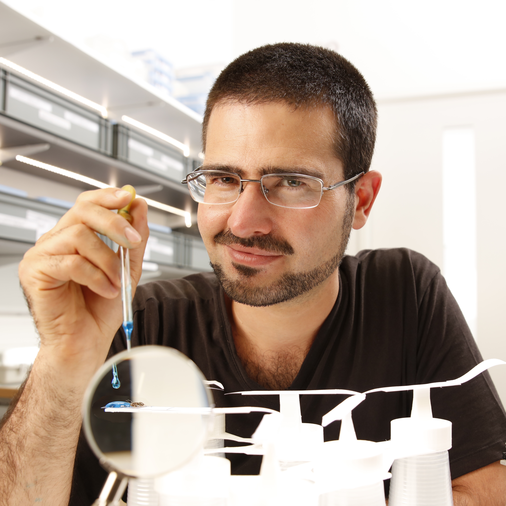Tomer Czaczkes awarded the Heinz Maier-Leibnitz-Prize
UR scientist receives prize for research at the interface between behavioral ecology and comparative psychology.
26 March 2024
Behavioral ecologist Dr Tomer Czaczkes from the Department of Zoology and Evolutionary Biology at the University of Regensburg has been awarded this year's Heinz Maier-Leibnitz-Prize by the German Research Foundation (DFG), the most prestigious award for early career scientists in Germany. A total of 168 researchers from all disciplines were nominated for the 2024 award. Only four women and six men will receive the coveted award. The awards will be presented in Berlin on 4 June.
Dr Tomer Czaczkes is head of the Animal Comparative Economics lab (ACElab), where he works at the interface of behavioral ecology and comparative psychology. He focuses on small creatures with complex minds: Using ants and bumblebees, he studies how to manipulate the foraging behavior of social insects. For example, how do ants process information and use it strategically? How do they perceive their environment and make decisions?
Using sophisticated experiments, he has shown that ants change their behavior if they have been disappointed by previous experiences. On the other hand, they are more "enthusiastic" about a food source for which they had to work harder. This shows that social insects can be manipulated in a similar way to humans - for example, customers exposed to hidden advertising. Among other things, Dr Czaczkes is now trying to use his findings to control invasive alien ant species.

Dr. Tomer Czaczkes Photo © Alexander von Humboldt Stiftung
"It is becoming increasingly clear that insects such as ants and bees are similar to us in many ways: They have memories and expectations, can exert self-control, and understand their world in complex ways. With this knowledge, we can see a meadow teeming with butterflies and bees, ants and crickets, as not just a field, but a teeming metropolis full of individuals," explains Tomer Czaczkes. "Winning the Heinz Maier-Leibnitz Prize is both a confirmation of our work to date and a fantastic motivation to continue our research in this highly interesting and complex field".
"An important part of science is to keep one's finger on the pulse of the times and to lay the foundations to support early career scientists as much as possible on their way. So it's all the better when these efforts are matched with the corresponding potential," says Professor Dr. Udo Hebel, President of the University of Regensburg. "I would therefore like to take this opportunity to congratulate Dr Czaczkes on his outstanding research and the well-deserved recognition of his work".
"The scientific elite of tomorrow is researching in Bavaria: the Heinz Maier-Leibnitz Prize is the most important prize for young scientists in Germany. With his work on ant colonies, Dr Tomer Czaczkes is investigating the interplay between individual memories and collective decision-making. As a politician, I am curious to see whether further results from this exciting research will help us to better understand aspects of human thought and behaviour. I can guarantee that with our €5.5 billion High-Tech Agenda Bavaria we will continue to create the best conditions for the best minds in Bavaria. Congratulations to Dr Tomer Czaczkes and all those involved at the University of Regensburg on this very special award," said Bavaria's Science Minister Markus Blume.
Information/Contact
The Heinz Maier-Leibnitz-Prize
The Heinz Maier-Leibnitz-Prize has been awarded annually since 1977 to outstanding researchers in the early stages of their academic careers. The aim of the prize is to support and encourage the winners, who do not yet hold a permanent professorship, in their scientific careers. The award is not only based on the quality of their dissertation, but also on whether they have gone on to develop an independent academic profile and have enriched the scientific community with their research, so that they can be expected to continue to achieve academic excellence in the future.
With the 2023 award round, the DFG has firmly integrated the prize into its funding portfolio, having previously awarded it jointly with the German Federal Ministry of Education and Research (BMBF). Since 1980, the prize has been named after the nuclear physicist and former DFG President Heinz Maier-Leibnitz, during whose term of office (1974-1979) it was first awarded. Further information
Dr Czaczkes will receive 200,000 euros in prize money for his further research, as well as a 22 percent program grant to cover indirect project costs.




